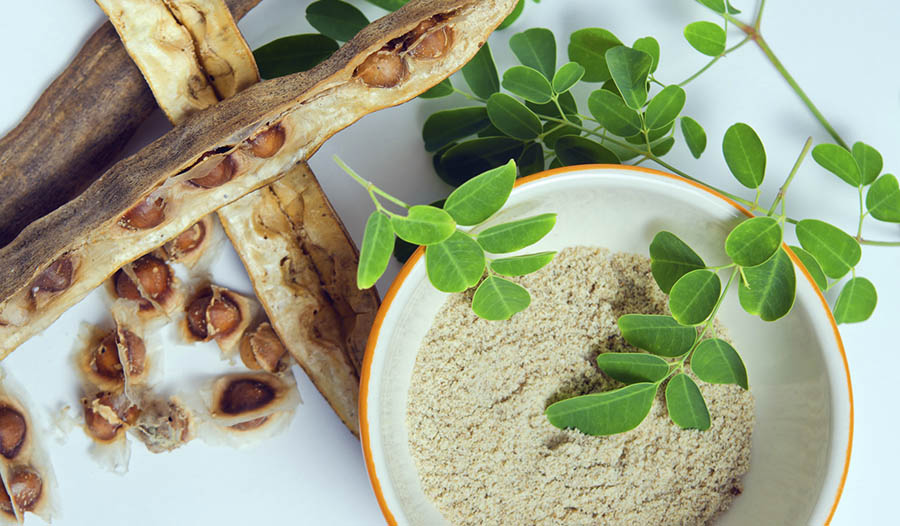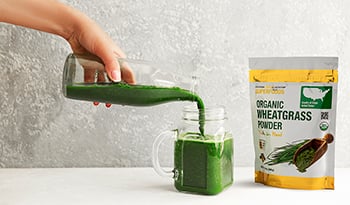The Health Benefits of Moringa + Easy Recipes

What Is Moringa?
Moringa oleifera is a fast-growing, deciduous tree native to India and Southeast Asia. Renowned for its resistance to drought, moringa is also known as the drumstick tree, miracle tree, and the tree of long life. Many parts of the tree are edible, including the leaves, green fruits or seed pods, fragrant flowers, and even the young seeds and roots. Moringa has a long history of being used as a health-promoting food and is now cultivated extensively as a food crop.
Moringa Nutrition
Moringa leaf powder is highly regarded as a superfood dietary supplement. Moringa leaf powder is rich in nutrients like vitamins and minerals and a wide range of health-promoting phytochemicals.1,2
One cup of fresh, chopped leaves provides:
- Protein: 2 grams
- Vitamin A (from beta-carotene): 9% of the RDA
- Riboflavin (B2): 11% of the RDA
- Vitamin B6:19% of the RDA
- Vitamin C:12% of the RDA
- Iron: 11% of the RDA
- Magnesium: 8% of the RDA
Moringa Health Benefits
Moringa powder is becoming a favorite health food supplement due to its many nutritional properties. The plant has unusually high levels of vitamins A, B and C, potassium, iron, magnesium, calcium , and zinc. These high levels of nutrients help build strong and shiny hair as well as healthy bones.
Moringa also contains very impressive levels of ascorbic acid and other antioxidant compounds. These antioxidants help prevent free radicals from doing damage, and their ability to protect from oxidative stress lowers inflammation throughout the body.
Powdered moringa leaves are even used in India and Africa to fortify the nutrient content of foods, typically by replacing 10% of the wheat flour with moringa leaf powder in bakery products.5
Antioxidant Benefits
While moringa leaf powder is rich in nutrients, it is also a rich source of phytochemicals, which explains why most people supplement with moringa-based products.1-3
Moringa leaf powder contains a wide range of health-promoting antioxidant compounds typical of green superfoods, including polyphenols, flavonoids, carotenoids, and glucosinolates. The latter compounds are found mainly in the cabbage (brassica or curciferous) family of vegetables.
Moringa is a member of the same order of plants (Brassicales) as the cabbage family. Interestingly, Moringa is also called the horseradish tree because its roots bear a similar taste to horseradish, a cabbage family member. The Moringa glucosinolates are different from the well-studied cabbage family glucosinolates, such as sulforaphane and indole-3-carbinol, but exert many of the same health benefits and some interesting anti-aging effects.6
Breastfeeding Benefits
Moringa leaf powder has also been shown to be a valuable nutritional aid during pregnancy and breastfeeding. In a review of 12 human studies in pregnant and breastfeeding women, researchers concluded that it produces favorable effects on the mother's iron and red blood cell levels and milk production.4 Moringa has also been shown to be helpful with the child's development and the incidence of illness during the first six months of life.
Menopause Benefits
In one double-blind study in menopausal women, results showed that the women taking 7 grams of moringa leaf powder every day for three months significantly increased blood antioxidant levels.10 Specifically, moringa leaf powder increased glutathione peroxidase by 18% and superoxide dismutase by 10.4% while lowering a marker of oxidative stress, malondialdehyde, by 16.3%.
Blood Sugar & Cholesterol Benefits
Moringa leaf powder supplementation also positively lowered fasting blood sugar levels by 13.5% and increased hemoglobin levels by 17.5%. In another placebo-controlled human study, moringa leaf consumption (120 g of cooked leaves) showed a positive effect on improving blood pressure measurements.11
Moringa leaf components have also been shown to have anti-inflammatory, liver-protecting, and wound-healing effects. Studies in animals and humans also show an ability to support normal cholesterol levels.1-3,7-9
How To Consume More Moringa
Moringa leaf powder is versatile as it can easily be added to smoothies, lattes, teas, yogurt, and other foods. Here are a few recipes to give you some ideas on using it.
Moringa Latte Recipe
Ingredients:
- 1 1/2 cups organic coconut or almond milk
- 1 1/2 rounded tsp. Moringa leaf powder
- 1 1/2 tsp. honey or allulose
Instructions:
- Place the moringa powder and honey or allulose in a mug. Mix well until thoroughly combined.
- Gently scald the coconut or almond milk in a saucepan.
- Pour a small amount of the milk into the honey or allulose and moringa mixture and stir or wisk well.
- Gently add the rest of the milk.
- Stir or wisk well and enjoy.
Moringa Key Lime Pie
Key lime pie is already bright green and has a mildly herbaceous flavor, so it is an obvious way to increase one's moringa intake. This recipe uses plenty of nuts, moringa, avocado, and lime to give a more nutrient-rich spin to the classic Key lime pie. It is dairy-free, sugar-free, and loaded with plant-based fats, so the recipe is ideal for vegans or those on low-carb diets. Another great advantage of this recipe is that it requires no baking and only a few minutes of active work.
Ingredients:
- 1 ½ cups of cashews
- 2 cups of pecans
- ¼ cup dried and shredded coconut
- 1 cup Medjool dates
- 2 tsp. moringa powder
- 3 Key limes, juiced
- 1 avocado
- ½ cup coconut cream
- ¼ cup melted coconut oil
- ⅓ cup honey, maple syrup or agave
Instructions:
- Cover the cashews with water and allow to soak overnight.
- Put the pecans in a processor and pulse until they have a crumb-like texture.
- Add the dates and dried coconut, and continue to whiz the ingredients together until a dough forms.
- Smooth the dough over the bottom of a 9-inch cake pan.
- Place soaked cashews and the remaining ingredients in the processor and blend them until a smooth, creamy mixture forms.
- Gently pour the filling over the crust.
- Freeze the Key lime pie for a few hours until a firm consistency is reached.
- Allow to thaw for 15 minutes before serving and enjoying. This pie serves eight to 12 depending on the size of the pie slices.
Moringa Meatball Recipe
Moringa is useful for more than baking. Because of its lightly spiced flavor, it can also be an excellent addition to savory dishes. This moringa meatball recipe has plenty of healthy herbs and spices that add flavor and nutrition. The meatballs can be served in pasta or soup, or they can be enjoyed by themselves.
Ingredients:
- 1 cup almond milk
- 4 eggs
- 1 cup cheese
- 1 ⅓ cup almond flour
- 4 cloves minced garlic
- 1 finely minced onion
- 2 tsp. sea salt
- ½ tsp. pepper
- 1 tsp. dried oregano
- 2 Tbs. dried basil
- 2 tsp. moringa powder
- 1 tsp. turmeric powder
- 2 pounds ground beef, turkey, pork, or chicken
Instructions:
- Preheat the oven to 350 degrees Fahrenheit and line a baking tray with parchment paper.
- Whisk together the almond milk and eggs in a large bowl.
- Put all the ingredients except the ground meat in the bowl and stir together thoroughly.
- Use clean hands to gently mix the ground meat with the mixture.
- Form meatballs that are roughly 2 inches in diameter. A cookie scoop may help in forming equal-sized meatballs.
- Place on the baking tray and cook for 30 minutes in the preheated oven.
- Remove from the tray and enjoy over pasta, in a sandwich or as part of another delicious dish. Depending on the size of the meatballs, this recipe makes approximately two dozen of them.
References:
- Camilleri E, Blundell R. A comprehensive review of the phytochemicals, health benefits, pharmacological safety and medicinal prospects of Moringaoleifera. Heliyon. 2024 Mar 8;10(6):e27807.
- Giuberti G., Rocchetti G., Montesano D., Lucini L. The potential of Moringa oleiferain food formulation: a promising source of functional compounds with health-promoting properties. Curr. Opin. Food Sci. 2021 Dec 1;42:257–269.
- Klimek-Szczykutowicz M, Gaweł-Bęben K, Rutka A, Blicharska E, Tatarczak-Michalewska M, Kulik-Siarek K, Kukula-Koch W, Malinowska MA, Szopa A. Moringa oleifera (drumstick tree)-nutraceutical, cosmetological and medicinal importance: a review. Front Pharmacol. 2024 Feb 2;15:1288382.
- Rotella R, Soriano JM, Llopis-González A, Morales-Suarez-Varela M. The Impact of Moringa oleifera Supplementation on Anemia and other Variables during Pregnancy and Breastfeeding: A Narrative Review. Nutrients. 2023 Jun 8;15(12):2674.
- Milla PG, Peñalver R, Nieto G. Health Benefits of Uses and Applications of Moringa oleifera in Bakery Products. Plants (Basel). 2021 Feb 6;10(2):318.
- Lopez-Rodriguez NA, Gaytán-Martínez M, de la Luz Reyes-Vega M, Loarca-Piña G. Glucosinolates and Isothiocyanates from Moringa oleifera: Chemical and Biological Approaches. Plant Foods Hum Nutr. 2020 Dec;75(4):447-457.
- Chiș A, Noubissi PA, Pop OL, Mureșan CI, Fokam Tagne MA, Kamgang R, Fodor A, Sitar-Tăut AV, Cozma A, Orășan OH, Hegheș SC, Vulturar R, Suharoschi R. Bioactive Compounds in Moringa oleifera: Mechanisms of Action, Focus on Their Anti-Inflammatory Properties. Plants (Basel). 2023 Dec 20;13(1):20.
- Hassan MA, Xu T, Tian Y, Zhong Y, Ali FAZ, Yang X, Lu B. Health benefits and phenolic compounds of Moringa oleifera leaves: A comprehensive review. Phytomedicine. 2021 Dec;93:153771.
- Rode SB, Dadmal A, Salankar HV. Nature's Gold (Moringa Oleifera): Miracle Properties. Cureus. 2022 Jul 7;14(7):e26640.
- Kushwaha S, Chawla P, Kochhar A. Effect of supplementation of drumstick (Moringa oleifera) and amaranth (Amaranthus tricolor) leaves powder on antioxidant profile and oxidative status among postmenopausal women. J Food Sci Technol. 2014 Nov;51(11):3464-9.
- Chan Sun M, Ruhomally ZB, Boojhawon R, Neergheen-Bhujun VS. Consumption of Moringa oleifera Lam Leaves Lowers Postprandial Blood Pressure. J Am Coll Nutr. 2020 Jan;39(1):54-62.
DISCLAIMER:This Wellness Hub does not intend to provide diagnosis...















































































 Table of Contents
Table of Contents
















